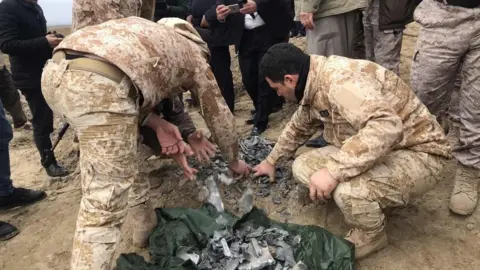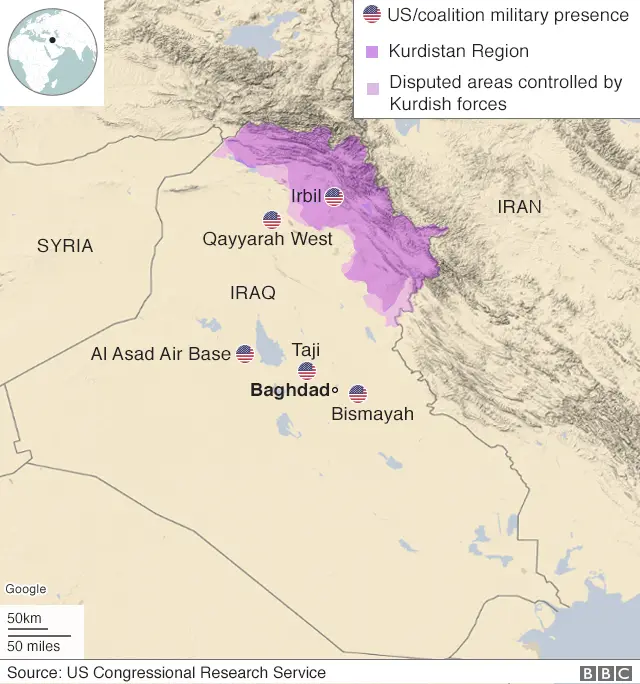Iran attack: Foreign Secretary Dominic Raab condemns missile strikes
 Getty Images
Getty ImagesDominic Raab has condemned a ballistic missile attack by Iran on air bases in Iraq where coalition forces, including British personnel, are stationed.
The foreign secretary urged Iran not to repeat "reckless and dangerous attacks" after strikes on bases in Irbil in the north, and al Asad, west of Baghdad.
The Ministry of Defence said there were no UK casualties.
Iran's Revolutionary Guard said the action was in retaliation for the death of General Qasem Soleimani on Friday.
He was killed outside Baghdad airport in a missile strike ordered by US President Donald Trump.
Mr Raab said he was concerned by reports of casualties and that a war in the Middle East would only benefit terrorist groups.
Prime Minister Boris Johnson will update the House of Commons later, and discuss the situation at a meeting with EU Commission President Ursula von der Leyen.
Acting Lib Dem leader Sr Ed Davey urged the PM to ensure "dialogue and a de-escalation of this intensifying situation" and said the strikes should be "unequivocally condemned".

Iran's Supreme Leader Ayatollah Khamenei described the attack as "a slap in the face" for the US.
The missile attack showed just a "small part" of the capabilities of the Iranian armed forces, the chief of staff the military said
But Iran's ambassador to the UK, Hamid Baeidinejad, said the attack was an act of self-defence and the country "does not seek escalation or war".
Allow X content?

The US president tweeted "all is well" following the strikes, adding that casualties and damage were being assessed and that he would make a statement on Wednesday morning.
BBC security correspondent Frank Gardner said there was provocative language used on both sides of the crisis, in Washington and Tehran.
Speaking on the Victoria Derbyshire programme, he added that the attack may mark the end of Iran's overt retaliation but there are a number of ways the country could choose to respond covertly in the coming weeks and months.
"The hardliners in Iran will still be baying for blood, so it's quite provocative for Donald Trump to say 'all is well'," he said.
"There are hardliners in the Iranian deep state - the whole security, intelligence and judicial apparatus - who distrust everything that the outside world and particularly the West does.
"They will want to carry on harassing and attacking US interest in the region until America leaves altogether."
More than a dozen missiles were fired from Iranian territories into Iraq at about 02:00 local time on Wednesday (22:30 GMT, Tuesday).
The al Asad airbase - located in the Anbar province of western Iraq - was hit by at least six missiles.
There are around 400 UK troops stationed in Iraq, primarily to assist Iraqi troops in defeating IS.
A Ministry of Defence spokesman added: "We are urgently working to establish the facts on the ground. Our first priority continues to be the security of British personnel."
In the UK, police are "extremely alert" to any impact the crisis in Iran may have in Britain, the Metropolitan Police commissioner Cressida Dick has said.
On Tuesday, the UK put the Royal Navy and military helicopters on standby in the Gulf amid the rising tensions in the Middle East.
The government said non-essential UK personnel had also been moved out of the Iraqi capital Baghdad.
Iran vowed "severe revenge" following the assassination of Soleimani on 3 January.
The general - who controlled Iran's proxy forces across the Middle East - was regarded as a terrorist by the US government.
